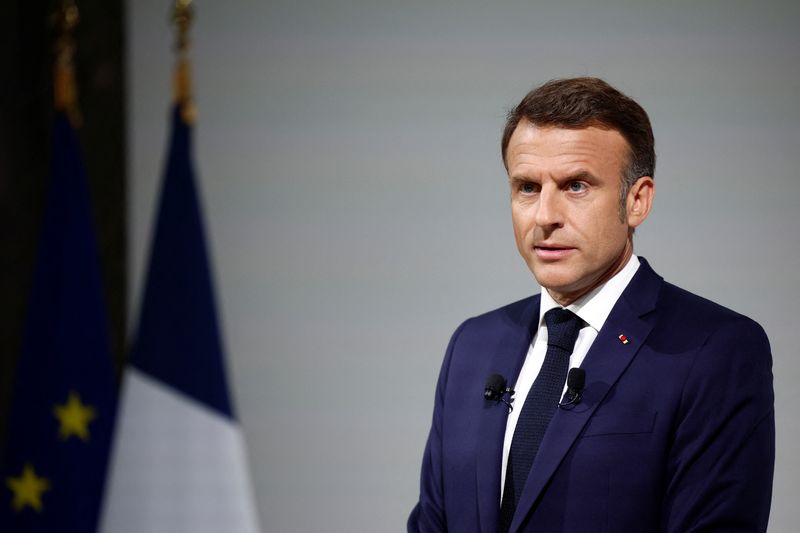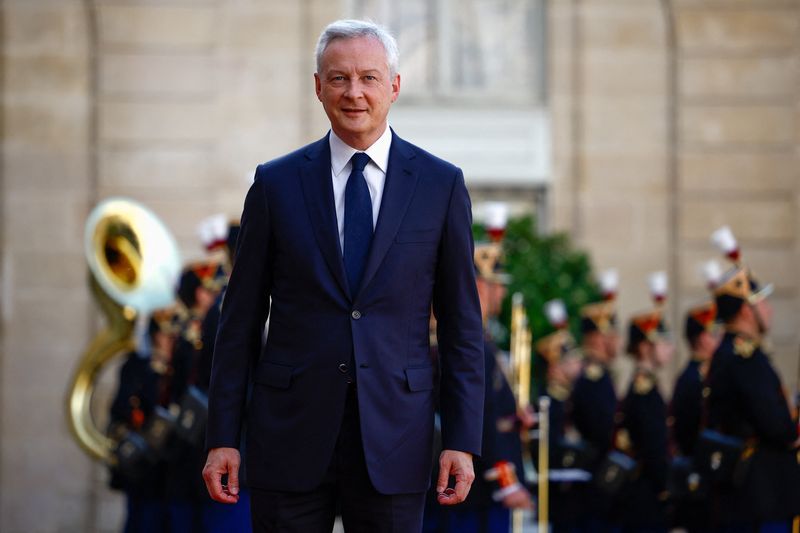By John Irish and Elizabeth Pineau
BORGO EGNAZIA, Italy (Reuters) -France is facing a "very serious" moment as parliamentary elections loom, said President Emmanuel Macron on Friday, with financial markets rattled by the country's far-right and far-left political blocs currently leading polls.
Political uncertainty has already triggered a brutal sell-off of French bonds and stocks after Macron unexpectedly called the election, following a trouncing of his ruling centrist party by Marine Le Pen's eurosceptic National Rally (RN) in last Sunday's European Parliament elections.
"We are at a very serious moment in the history of our country. There are major issues at stake, with wars, and with unprecedented economic challenges," said Macron, speaking at the end of a G7 summit in Italy.
Macron's comments echoed an earlier warning on Friday by French Finance Minister Bruno Le Maire, who said that France - which is the euro zone's second-biggest economy - faced the risk of a financial crisis if either the far right or left won the coming parliamentary election because of their heavy spending plans.
Calling the two blocs "extremist", Macron said neither were serious politically or realistic economically.
A first series of opinion polls have projected that the RN, which has promised to cut electricity prices and VAT on gas and increase public spending, could win the election and be in a position to run the government.
A poll conducted for Le Point magazine, published on Friday evening, forecast National Rally as in the lead in the first round of the parliamentary election, narrowly ahead of a coalition of left-wing parties called the "Popular Front".
The poll said RN would get 29.5% of votes, compared to 28.5% for Popular Front and 18% for Macron's camp.
At least two polls have put the left not far behind the RN, and ahead of Macron's centrist camp.
Those polls were carried out before left-wing parties agreed a deal to run on a joint platform to try to counter the far right and Macron's camp with pledges to link salaries to inflation and introduce a wealth tax for the rich.
The RN calls for protectionist "France first" economic policies.
It is expected to announce details of its economic programme in coming days and has so far given only broad brush comments on increasing household purchasing power and cutting energy prices.
'SLIPPERY SLOPE'
Judging by proposals from the last parliamentary election in 2022, which it has said it will largely stick to, it would cut VAT on energy to 5.5% from 20% now and increase public spending, despite already significant levels of public debt.
Visiting a farm in Chuelles, south of Paris, RN leader Jordan Bardella said that would be financed partly by acting against tax loopholes.
Action on cost-of-living issues would be one of his priorities, he said, alongside cutting immigration and being tough on crime.
"France is on a slippery slope, it is at risk of bankruptcy," he said, urging the French to "dare to choose change."
Worries about stability have triggered the biggest weekly jump since 2011 in the premium investors demand to hold French government debt, and bank stocks tumbled this week.
Senior bosses at leading French technology firms have warned that curbs to immigration proposed by the far-right National Rally party pose a threat to the country's ambition to become Europe's leading AI hub.
Meanwhile, left-wing parties set aside differences to strike a deal late on Thursday that includes scrapping Macron's unpopular pension reform.
"Emmanuel Macron won't have a majority," Greens leader Marine Tondelier said.

"It's either the far right or us," she said, urging left-wing voters to back the new alliance, dubbed the "Popular Front," which gathers the Socialists, Greens, Communists, and hard-left Unbowed France in an alliance.
Unions and rights groups have called on people to take part in rallies against the far right at the weekend.
